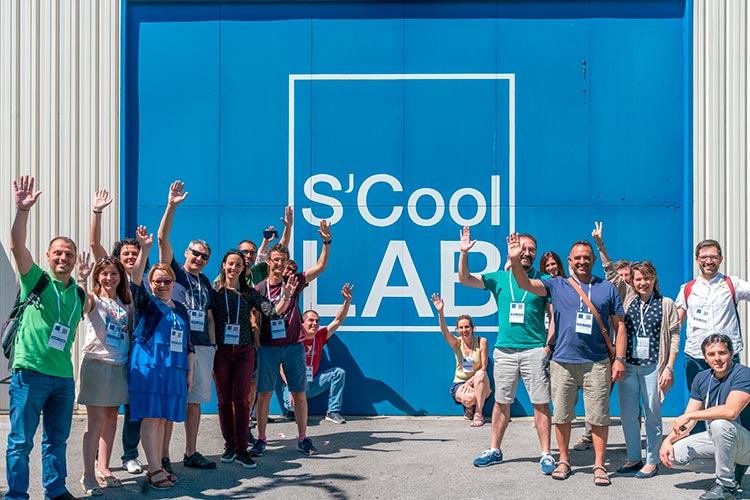Two Andalusian professors expand their science training at CERN thanks to Hidralia and Fundación Aquae
The objective is to train them in the latest scientific advances and thus be able to awaken STEM vocations among their students. These teachers from Jaén and Almería will travel to Geneva from June 23 to 28
For the third consecutive year, Hidralia and its foundation, Fundación Aquae, are promoting the Teacher Training Program, thanks to which two science and technology teachers from Jaén and Almería will travel from June 23 to 28 to Geneva to attend an intensive course of high level at the headquarters of CERN, the largest particle physics research laboratory in the world.

The objective of this program, which since its inception has already granted scholarships to 60 professors, is twofold: on the one hand, to facilitate the updating of the theoretical and technical knowledge of the scholarship holders; and, on the other hand, to offer them tools so that they can apply this knowledge in the classroom, thus encouraging scientific vocations among their students, and encouraging them to take university courses in STEM (Science, Technology, Engineering and Mathematics).
According to Jeff Wiener, director of S'cool Lab (Teaching Program for Teachers at CERN), "one of the greatest benefits of this program is that Spanish teachers are direct witnesses of the real research process. In fact, all our programs are taught by researchers and experts in different fields who share with our teachers what is happening at CERN. In this way, teachers update their knowledge about particle physics and, in addition, learn new ideas on how to present this knowledge to their respective students. Another great benefit is the international and collaborative atmosphere that "breathes" in CERN, which also extends their experience and confidence and motivates them to encourage their students to study STEM".
Natalia Rodríguez (Institute of Secondary Education of Almizerán, in Jaén) and Enrique López-Gay (IES El Parador, in Almería) are two of the 20 teachers of science and technology in Spain who have been selected to travel to the "heart" of CERN . The rest of the teachers come from Catalonia, the Valencian Community, the Basque Country, Galicia, Castilla La Mancha, Castilla y León, Melilla, the Balearic Islands and the Canary Islands.
These teachers will attend for a week to master classes, lectures, practical workshops, discussion sessions and exhibitions, where they will learn the latest developments and discoveries made at CERN and expand their knowledge in physics, engineering and computing, improving their preparation for the development of his teaching activity in Spain. They will also visit experimental facilities of this leading research center in the world.
"STEM careers have a high demand for work and if students choose to study a career in this field they will most likely end up in an interesting and demanding job. The tendency is that more and more STEM areas will resemble one another. For example, at CERN, most scientists work on international and multidisciplinary research projects. In this sense, any STEM field represents a fantastic option for students, although with time their field of experience adapts to the developments in progress. Any STEM knowledge, especially the practice of scientific methods, can be used universally. Therefore, all STEM subjects can provide students with a great base to develop successful careers outside of this field", says Wiener.
This project is the result of the collaboration started in 2017 between Fundación Aquae and the CERN & Society Foundation, which will continue until the end of this year. With the support of the Teacher Training Program, in 2017 Fundación Aquae became the first Spanish institution to join the CERN & Society Foundation since its creation.
Companies demand STEM professions
The report 'The future employment of young people' (based on 12,000 interviews to students of 16-20 years of our country), published by Educa 20.20 in June 2017, reveals that in Spain only 12.9% of children will choose science degrees, a branch for which only 8.8% of girls will choose. Figures that contrast with the upward demand for STEM profiles by companies in our country. In this sense, the report 'EPyCE 2017. Positions and Competences more Demands' indicates that the profession most requested by companies in Spain is that of computer engineer, followed by three technological profiles: Big Data specialist, Data Science specialist and programmer computer
Founded in 1954, CERN currently consists of 22 member states, and has eight associate states, six observers and 57 collaborators. CERN research has enriched human knowledge with advances ranging from medical applications in cancer treatments or diagnostic imaging, to the development of the World Wide Web (www) or the finding of the Higgs Boson, a historic milestone for the Particle Physics For its part, the CERN & Society Foundation is an independent non-profit organization, under Swiss private law, with activities of public interest. Created in 2014, its objective is to support and disseminate the benefits of CERN's research, through education and dissemination, innovation and the exchange of knowledge, as well as culture and the arts.
